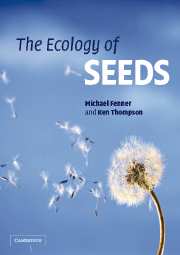4 - Soil seed banks
Published online by Cambridge University Press: 18 December 2009
Summary
Mature seeds are shed from the parent plant and, sooner or later, find themselves at the soil surface. Germination may then take place immediately or may be delayed for an indefinite period. During this time, the seeds on or in the soil are said to form a soil seed bank. A number of schemes have been published with the aim of describing and classifying the different types of seed bank (Csontos & Tamas, 2003). Perhaps the most widely employed in temperate regions is the scheme of Thompson & Grime (1979), which recognizes four types (Fig. 4.1). Type I are autumn-germinating species, whose seeds are present during the summer only. Type II are spring-germinating and present mainly during the winter. Seeds of both are often, but not always, dormant when shed, this dormancy being broken by a period of low or high temperatures in types I and II, respectively. Both are described as transient, since normally no seeds persist in the soil for more than one year. In types III and IV, a smaller or larger fraction of the seed output enters a persistent seed bank, which survives for more than one year. In fact, types III and IV are clearly ends of a continuum, and it is now apparent that the same species may behave as type III or IV at different times and in different places (Cummins & Miller, 2002).
- Type
- Chapter
- Information
- The Ecology of Seeds , pp. 76 - 96Publisher: Cambridge University PressPrint publication year: 2005
- 1
- Cited by

